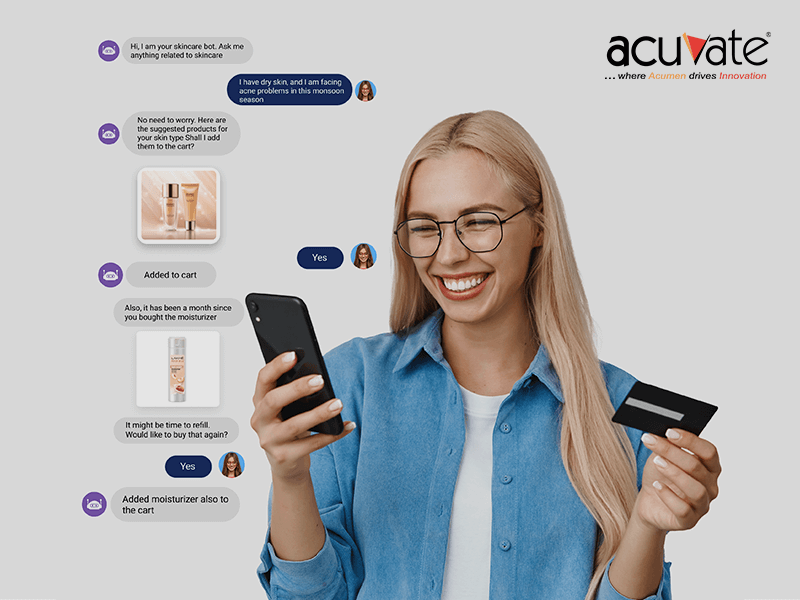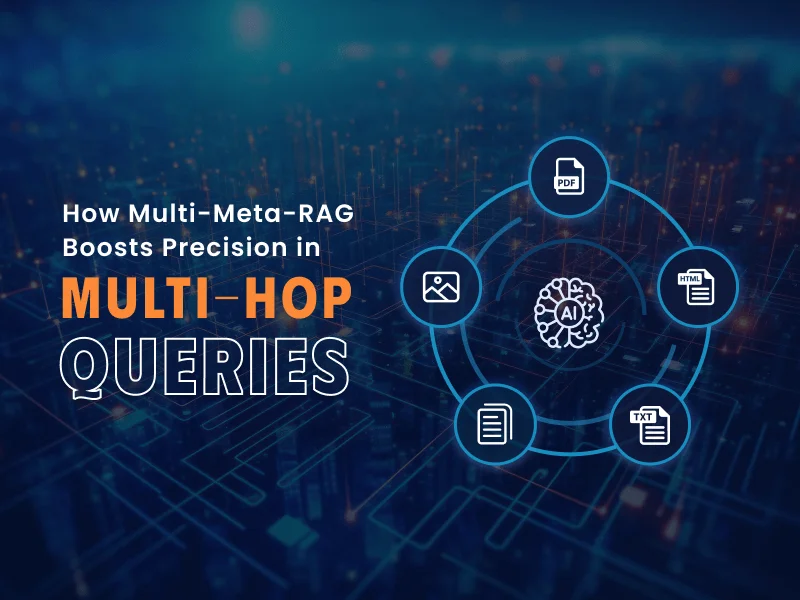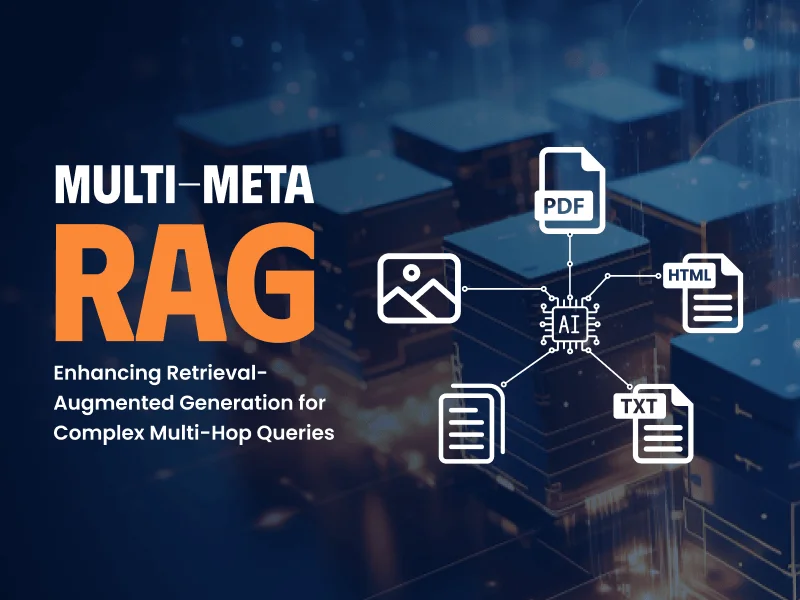Recent surveys suggest that a startling 87% of online shoppers may abandon their shopping cart due to excessive complexity or amount of time spent. It’s therefore crucial that your online shopping process is simple and seamless, from browsing to checkout. The demand for businesses to evolve and provide a satisfying e-commerce experience has only increased technologies like artificial intelligence, machine learning, and the latest entrant to this powerhouse: GPT-powered chatbots.
By making tailored product suggestions, aiding in customer service, and simplifying the customer journey, these technologies have the potential to boost both customer satisfaction and revenue.
GPT-powered Chatbots: How They Improve Customer Conversations
GPT-powered chatbots are shifting the nature of conversations, from ChatGPT’s rapid growth among consumers and workers around the world to truly human enterprise chatbots transforming CX and EX forever. E-commerce, specifically, stands to gain tremendously from these recent shifts, ultimately delivering the smooth shopping journeys consumers expect, demand and deserve.
GPT-powered chatbots employ advanced natural language processing (NLP) capabilities, enabling them to understand and respond to human language in a contextually relevant manner.
Some immediate benefits for GPT-powered chatbots in online retail include:
1. Customer support
Another crucial role of GPT-powered chatbots in e-commerce is their capacity to provide not just 24/7 customer support but highly contextual support.
GPT-powered chatbots also play a significant role in conversational marketing by engaging customers in interactive dialogues that promote products and services. This proactive approach facilitates a more natural and engaging communication style, leading to higher conversion rates and sales.
And the best part is these chatbots self-trains on enterprise documents, website content, etc, using GPT technology, eliminating the need for time-consuming training and retraining.
2. Market research and product improvement
GPT chatbots can moderate customer feedback by engaging users in post-purchase surveys and contextual, relevant and highly human and nuanced discussions previously unknown in the conversational AI world. This real-time feedback helps businesses identify areas for improvement and adjust their offerings to meet customer expectations, thus fostering long-term relationships.
3. Cost-effectiveness
Every year, businesses all over the world spend billions of dollars on call lines to handle customer support requests.
According to a McKinsey survey on insurance companies, using automation techniques can cut down on customer service costs by up to 30 percent. Smarter GPT-enabled chatbots can now juggle several customer enquiries contextually in a jiffy, by searching for information from multiple sources & providing lightning-fast responses that are personalized & easy to understand.
4. Detecting suspicious activity
Retailers have a significant challenge from fraudulent activity, and many of the processes and tools now available to combat it are costly and time-consuming. More importantly, several of these tools – such as one-time-passwords and identity verification – become extremely frustrating for the customer, breaking their journey, and sometimes putting them off enough to put a stop on that shopping journey completely.
GPT changes that and empowers retailers to offer watertight security across their transactions without adding friction to the customer journey. The ability to quickly analyze vast amounts of data allows it to detect potentially fraudulent activities, such as unusual buying patterns, multiple orders to the same location, or the use of multiple credit cards to buy expensive items. These chatbots can be customized by retailers to better detect and prevent fraud by learning from past incidents.
5. Personalized purchase recommendations
One of the most significant benefits of GPT-powered chatbots is their ability to offer truly personalized shopping experiences for customers.
By analyzing user data and past purchases, these AI-driven virtual assistants make tailored product recommendations that cater to individual preferences. This personalization not only improves customer satisfaction but also boosts the likelihood of repeat purchases and increased customer loyalty.
Personalized purchase recommendations is one of the most powerful use cases for GPT chatbots in retail. Let’s dive into this a little deeper.
How GPT-powered, Hyper-Personalized Upsell and Cross-sell Conversations Improve CX, Retention and Revenue
Over the years, customer retention has been one of the biggest constraints as well as revenue drivers for ecommerce businesses. Sample this: The top five players in the sector have an average customer retention of a staggering 94%. That practically means that almost all of their customers are repeat customers. This is usually because while it’s only about 5-20% possible to sell to a new customer, that same number goes as high as 60% for repeat customers.
But how can a business bring back customers and increase average order values in the digital world strife with choices, options and distractions? Upselling and cross-selling have proven to be effective. While upsells improve ecommerce revenues nearly by a third, cross-sells aren’t far behind with a 20% positive impact on revenue.
And yet, over a third of marketers shy away from upselling and cross-selling. The challenge usually is that they don’t know where to start. Upselling and cross-selling needs much more than just knowing what a customer bought last.
Is a gym gear buyer necessarily a fitness enthusiast or is making that purchase as a gift?
Is an upsell email enough to bring the customer back for a purchase or do they need a persuasive offer?
If we want to cross-sell to a chatbot, for example, what should its data sources be?
And these questions only scratch the surface of the complexity of upselling and cross selling for customer retention. However, GPT-powered chatbots simplify upselling and cross-selling, with the simple, seamless power of contextual conversations. If you’re a fashion retailer, your GPT chatbot is the best digital personal stylist your customer could imagine. If you’re a skincare CPG, your GPT powered chatbot is a savvy skin advisor. If you’re a grocery brand, your GPT-powered chatbot is a sous chef, or a storehouse of grandma’s recipes.
Some of the key benefits of a GPT-powered upselling and cross-selling chatbot include:
1. Personalization
Personalization is the key to providing an exceptional shopping experience. GPT-powered chatbots enable businesses to offer tailored product recommendations based on customer preferences and browsing history. By understanding individual customer needs, chatbots can make relevant suggestions, ultimately leading to increased customer satisfaction and loyalty.
2. Omnichannel Integration
Integrating chatbots across various communication channels, such as social media, websites, and messaging apps, ensures a consistent and seamless shopping experience. Customers can easily switch between channels, and the chatbot can provide real-time assistance, keeping the sales process moving smoothly.
3. Proactive Engagement
GPT-powered chatbots can proactively engage customers by initiating conversations based on user intents, offering exclusive deals, and providing timely reminders about abandoned carts. By focusing on customer needs and addressing pain points, chatbots can drive sales by encouraging customers to complete their purchases or consider additional products.
4. Real-time Inventory and Pricing Updates
GPT-powered chatbots should be integrated with the company’s inventory and pricing systems to provide accurate, real-time information. This ensures that customers receive the most up-to-date product details, preventing any miscommunication or dissatisfaction that may arise from outdated information.
5. Simplified checkout process
Use GPT-powered chatbots to guide customers through the checkout process, providing support for various payment methods, addressing concerns, and answering questions. This ensures a smooth and efficient transaction, reducing cart abandonment rates.
6. Post-purchase Support
Providing exceptional post-purchase support is vital for a seamless shopping experience. GPT-powered chatbots can handle customer inquiries, process returns, and facilitate exchanges, leading to increased customer satisfaction and repeat business.
GPT-powered chatbots excel at personalization, using AI and ML technologies to analyze customer data and provide relevant, tailored suggestions. It can also improve cross-sell and upsell opportunities by:
- Analyzing Customer Data: Chatbots can process vast amounts of customer data quickly and accurately, providing personalized recommendations based on customers’ preferences, purchase history, and browsing behavior.
- Contextual Understanding: GPT-powered chatbots can understand the context of customer interactions, enabling them to make more relevant and timely product suggestions.
- Reducing Friction: By providing a seamless, intuitive shopping experience, GPT-powered chatbots can reduce friction in the sales process, making customers more likely to purchase additional items.
- Fostering Trust: As customers become more familiar with chatbot interactions, they will likely develop trust in the personalized recommendations provided, leading to increased upsell and cross-sell opportunities.
- Real-time Assistance: GPT-powered chatbots can offer real-time support and assistance, guiding customers through the decision-making process and addressing any concerns or questions that may arise.
But is this all to GPT-powered cross-selling and upselling? Not by a long shot! With GPT making some brilliant strides in the world of conversational AI, the revolution has just about begun.
How Continuous Training and Improvement of GPT Models will Improve Upsell and Cross-sell Recommendations
As GPT evolves, businesses are turning to artificial intelligence and natural language processing models, such as GPT, to enhance their upsell and cross-sell recommendations.
Continuous training and improvement of these models can significantly improve the effectiveness of these strategies.
1. Improving Upsell Recommendations
Upselling involves offering customers a higher-priced item or an upgrade to their current purchase. The key to successful upselling is understanding the customer’s needs and preferences. By continuously training and improving GPT models, businesses can achieve the following benefits in their upselling strategies:
- Enhanced Personalization: GPT models can analyze vast amounts of customer data to understand individual preferences and purchasing behavior. With continuous training, these models can provide highly personalized upsell recommendations that align with customers’ unique needs.
- Dynamic Pricing: GPT models can be trained to analyze market trends, competitor offerings, and customer data to suggest optimal pricing strategies. As a result, businesses can offer upsell options at the right price points to encourage customer conversion.
- Improved Timing: Continuously trained GPT models can identify the best moments to offer upsell recommendations based on customer behavior and purchase history. This ensures that upsell offers are presented at the most opportune times, increasing the likelihood of a successful upsell.
2. Enhancing Cross-Sell Recommendations
Cross-selling involves offering customers additional products or services that complement their initial purchase. Continuous training and improvement of GPT models can improve cross-selling strategies as follows:
- Contextual Understanding: GPT models can understand the context of customer interactions and purchases, allowing them to recommend relevant cross-sell options. Continuous training ensures these recommendations are updated based on the latest customer data and trends.
- Intelligent Bundling: GPT models can analyze customer preferences and purchase patterns to identify complementary products or services. Businesses can leverage this information to create intelligent bundles that encourage customers to purchase additional items.
- Streamlined Communication: Continuously trained GPT models can generate persuasive and engaging marketing messages for cross-selling offers. This ensures that customers receive clear and compelling communication, increasing the likelihood of a successful cross-sell.
How Acuvate Powers an AI-powered Shopping Experience with Acuvate
We’ll answer that with a story.
A global CPG brand with a presence in 190 countries approached Acuvate to implement a customer assistance chatbot solution for its 400+ brands that range from haircare to personal hygiene. Live chat played a significant role in their multichannel approach, putting pressure on revenue and personnel. They were eager to try new things in order to give their clients something special. Given the scope and complexity of their operation, however, they need more than the one-dimensional capabilities of typical chatbots.
Acuvate’s conversational AI experts infused the powers of Natural Language Modelling, Sentiment Analysis, Question and Answer Maker, to provide solutions for customer queries instantaneously.
Combined with Power BI and Meta Analytics, the customer inputs could be easily processed, while the integration with WhatsApp and Facebook Messenger ensured its ease of access. With Language Translation and Spell Check combined with support for 90+ languages ensures that it can be implemented without linguistic concerns.
The two types of bots – Customer Service Bots and Customer Engagement Bots were provided as part of the solution.
Customer Service Bot: It was tasked with collecting product feedback and providing solutions to frequently encountered issues. The bot could also encourage newsletter subscriptions, lead them to the contact form and facilitate smooth live chat handover.
Customer Engagement Bot: It provides personalized product recommendations, manages loyalty rewards, and uses gamification methods to increase customer participation. The bot could also suggest usage tips for the product, thereby enhancing the overall experience.
The persona-based engagement chatbots by Acuvate delivered 4000+ subscriptions, and a 65% reduction in live agent handovers, freeing up customer support personnel. There was a 4.3x increase in sales, with 95% of the user base satisfied with the chatbot interactions.
And here’s a twist: These results happened in 2021. Two years before GPT became the buzzword it is, in 2023. This is where things get interesting.
The Way Forward - ChatBots Humanized with GPT
The case study demonstrates Acuvate’s breadth and depth of expertise in fool-proof, future-proof conversational AI for retail contexts. With GPT and Generative AI’s recent strides, Acuvate’s conversational AI capabilities just got better.
By offering highly personalized and contextually relevant suggestions, GPT-powered chatbots can increase the likelihood of customers accepting upsell and cross-sell offers. Additionally, these can assist with dynamic pricing, optimal timing, intelligent bundling, and streamlined communication.
Train your chatbot in three easy steps using our technology which is built to learn from extremely dynamic unstructured data. Simply add your business’s documents to the knowledge repository, and our chatbot will train itself.
Acuvate’s GPT-powered enterprise chatbots are at the cutting-edge of AI, CX and ecommerce operations. With GPT technology and Acuvate’s extensive expertise in retail and CX chatbots, brands have unparalleled benefits: advanced natural language understanding and human-like, truly empathetic conversations, seamless integration across channels of your choice, and the ability to provide personalized experiences and upsell and cross-sell recommendations, to name just a few.
Transform your customer interactions and optimize retail operations. It all starts with Acuvate. Click here to request a personalized demo.
Welcome to the new age of conversations!



